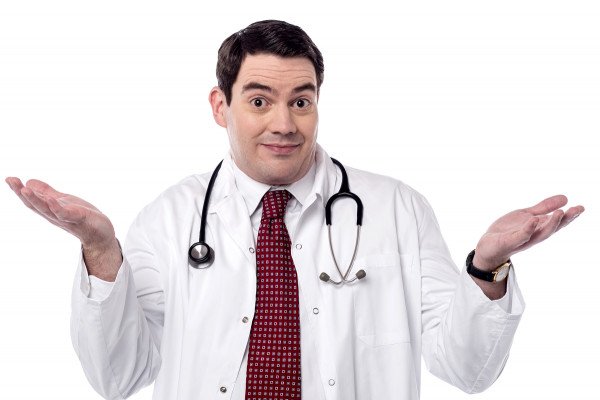Seeing a doctor after a car accident is one of the most important decisions you’ll make, but what if you picked the wrong one? Choosing the right accident doctor can directly affect your health, recovery timeline, and even your injury claim. If you’re starting to feel uneasy about your provider, it’s time to pay attention.
Table of Contents
Here are five warning signs that may indicate it’s time to find a new accident doctor:
1. They Don’t Specialize in Car Accident Injuries

After a car accident, not just any doctor will do. Many people make the mistake of visiting their primary care physician (PCP), urgent care, or even a walk-in clinic, only to discover later that these providers aren’t equipped to handle the medical, legal, and insurance complexities of a personal injury case.
🚫 Why Your Regular Doctor Might Not Be the Right Choice
Primary care doctors are trained to treat general health issues like colds, chronic conditions, and preventive care. But when it comes to auto accident injuries, like whiplash, spinal misalignment, herniated discs, or soft tissue damage. They may miss the signs or fail to document them properly.
Here’s why that matters:
- Missed Diagnoses: Car accident injuries often require specialized diagnostic imaging (MRI, CT scans, etc.) and physical exams designed to detect trauma. A non-specialist may not even know what to look for.
- Inadequate Documentation: Your treatment records serve as legal proof of your injury. If they aren’t detailed, consistent, and properly dated, they can be challenged by insurance adjusters or attorneys.
- Insurance Confusion: Most PCPs don’t bill auto insurance, PIP, MedPay, or work on a lien, and might tell you to use your regular health insurance.
- No Experience with Personal Injury Attorneys: Accident specialists understand how to work with lawyers and provide necessary documents like narrative reports, diagnostic codes, and disability notes.
✅ What Makes an Accident Doctor Different?
An experienced accident doctor is someone who:
- Focuses specifically on personal injury cases
- Knows how to properly document trauma-related injuries
- Understands how to bill auto insurance directly
- Coordinates with personal injury attorneys
- Follows your case from first evaluation through recovery
They may be chiropractors, orthopedic doctors, neurologists, pain management specialists, or multi-disciplinary providers, all trained to handle car crash injuries and support your recovery and claim.
🔍 Example:
Imagine you suffer whiplash after a rear-end collision. A primary care doctor might tell you to rest and take ibuprofen. But an accident specialist will:
- Document range of motion loss
- Order imaging if needed
- Provide targeted therapies
- Track your functional improvement
- Create a paper trail for your legal case
That level of care could make the difference between a denied claim and full compensation.
📍 Pro Tip:
Always ask if the doctor has experience treating car accident victims, working with auto insurance, and providing documentation. If they hesitate, it’s probably time to find someone else.
2. They Rush You Through the Visit or Don’t Listen
One of the biggest red flags after a car accident is when your doctor treats you like just another number. If your doctor doesn’t take the time to listen, evaluate your symptoms thoroughly, or explain your treatment, it can negatively affect both your recovery and your personal injury claim.

🕒 Why Time Matters After a Car Accident
Accident-related injuries can be subtle, complex, and evolve over time. Symptoms like pain, dizziness, stiffness, or numbness may not show up immediately. A rushed appointment often leads to:
- Missed or underreported symptoms
- Inadequate diagnostic testing
- Lack of trust between patient and doctor
- Weak or incomplete medical documentation
If your doctor seems in a hurry, avoids your questions, or cuts the visit short, you might not get the care, or the records you need.
📋 Signs You’re Being Rushed or Ignored
- You’re in the room for less than 10 minutes.
- The doctor interrupts or dismisses your concerns.
- You’re told, “It’s probably just soreness,” with no follow-up.
- You’re not offered a detailed treatment plan or imaging tests.
- They fail to note all of your symptoms in writing.
This isn’t just frustrating, it’s dangerous. Injuries like whiplash, herniated discs, nerve damage, or traumatic brain injuries may go undiagnosed without a thorough exam and proper follow-up.
🔍 Listening Leads to Better Outcomes
A good accident doctor takes the time to:
- Listen carefully to how the accident occurred (because the type of collision can indicate the likely injury).
- Ask about symptoms beyond the obvious, like headaches, numbness, or memory issues.
- Conduct a full physical and neurological evaluation tailored to trauma cases.
- Order imaging (X-rays, MRIs, CT scans) to rule out underlying injuries.
- Explain next steps, such as chiropractic care, physical therapy, or referral to a specialist.
This careful attention isn’t just about better health—it also ensures that your medical records accurately reflect your injuries, which is critical if you’re filing a personal injury claim or working with an attorney.
💡 Why This Impacts Your Legal Case
Insurance companies and opposing attorneys look closely at your medical records. If your doctor failed to document something because they didn’t ask, or didn’t listen, it could be used against you.
For example:
- “Doctor’s notes don’t mention neck pain.”
- “No diagnostic tests were performed.”
- “Only one complaint was listed, despite multiple symptoms.”
This kind of oversight can reduce your settlement or delay your compensation.
✅ What to Look for Instead
You deserve a doctor who:
- Makes you feel heard and respected
- Asks detailed questions about your pain and symptoms
- Schedules follow-ups and monitors your recovery
- Communicates clearly and educates you about your condition
- Understands how to document injuries for insurance and legal purposes
3. They Don’t Offer a Clear Treatment Plan
After being involved in an accident, your recovery should be the top priority, and that requires more than just a quick fix or a generic approach. The right doctor should provide a tailored, comprehensive treatment plan designed specifically for your unique needs. This plan should consider the type and severity of your injury, your lifestyle, and long-term recovery goals. A well-thought-out treatment strategy can make a world of difference in how quickly and completely you heal.
A clear treatment plan may include a combination of different therapies and interventions, such as:
- 🏋️♀️ Physical therapy: For restoring mobility, strength, and function.
- 🔄 Chiropractic care: To realign the spine and help with musculoskeletal pain.
- 📸 Imaging (X-rays, MRIs, etc.): To assess the extent of your injury and rule out underlying issues.
- 📅 Follow-ups: Regular check-ins to monitor your progress, make adjustments to the treatment plan, and ensure you’re on the right path toward recovery.
Red Flags:
- ❓ No explanation of next steps: After the initial consultation, you should have a clear understanding of what the recovery process will look like. If your doctor can’t outline a plan for the future or is vague about what’s to come, it may be a sign they’re not fully invested in your long-term care.
- 🚫 No referrals for specialists (even when needed): Some injuries, especially those resulting from accidents, may require the expertise of specialists, like neurologists, orthopedic surgeons, or pain management experts. A doctor who doesn’t recognize when you need specialist care, or who fails to refer you when necessary, could be putting your recovery at risk.
- 🔄 No reevaluation over time: Your injury could change as you heal, so it’s important that your treatment plan is regularly updated. If your doctor isn’t reassessing your progress or making adjustments to your plan as needed, they might not be tracking your recovery closely enough. Reevaluation ensures that your treatment plan stays effective and responsive to any changes in your condition.
The Right Approach:
An experienced accident doctor understands the importance of tracking your recovery closely and adjusting your treatment as you progress. They’ll monitor your condition over time, provide referrals to specialists when needed, and adjust the treatment plan to ensure you’re recovering as efficiently and safely as possible. In many cases, your treatment may not end until you reach Maximum Medical Improvement (MMI), which means you’ve recovered as much as you’re going to, and it’s time to transition to any necessary long-term care or management.
A personalized, evolving treatment plan is crucial in ensuring that you recover fully and efficiently. If your doctor isn’t offering this kind of attention, it’s time to seek a second opinion from someone who can give you the care you deserve.
4. They Refuse to Work on a Lien or Don’t Accept PIP/MedPay
Dealing with the aftermath of an accident is stressful enough without having to worry about how you’re going to pay for treatment. The right doctor should make this part of your recovery process easier, not harder. If your doctor demands upfront payment or refuses to work with your car insurance, it’s a major red flag. This could indicate they’re not set up to handle accident-related cases, which typically require a different approach to payment.

In many accident cases, especially when the injury is a result of a car crash, the costs of treatment can add up quickly. Fortunately, there are insurance options that can help cover those costs, allowing you to get the care you need without financial strain:
- PIP (Personal Injury Protection): This type of coverage is available through your auto insurance and can help pay for medical bills after an accident, regardless of who is at fault. It typically covers medical expenses, lost wages, and other costs related to your recovery. Doctors who refuse to accept PIP may not be familiar with the intricacies of accident-related care or may not want to deal with the insurance process, which can be time-consuming.
- MedPay (Medical Payments Coverage): MedPay is similar to PIP but may be an optional coverage on your auto insurance policy. It covers medical expenses for you and passengers in your vehicle after an accident, regardless of fault. MedPay can help cover immediate treatment costs and is typically used for minor injuries or as a supplement to other insurance.
- Attorney Liens or Letters of Protection (LOPs): Sometimes, after an accident, you might not have the money to pay for treatment upfront, and your doctor may agree to wait for payment until your case settles. In these instances, the doctor can work with your attorney to secure payment through an attorney lien or Letter of Protection (LOP). This means the doctor agrees to treat you and get paid from the proceeds of your settlement or court judgment after your case is resolved. A doctor who works with attorney liens or LOPs is typically experienced in handling accident-related care and understands the financial complexities of these cases.
Red Flags:
- 💰 Upfront payment demands: If the doctor demands that you pay out-of-pocket or doesn’t offer payment options that work for accident victims, they may not be familiar with accident recovery procedures or how insurance can assist with payment. This could make it harder for you to receive the care you need when you’re already dealing with financial and physical stress.
- 🚫 Refusing to work with your car insurance: If a doctor refuses to work with your car insurance company, whether through PIP or MedPay, it can be a sign that they either don’t understand accident cases or don’t want to deal with the paperwork and billing that often comes with them. An experienced accident doctor should be comfortable navigating the insurance process and working with your insurance providers to ensure you get the necessary care without financial hardship.
- 🔒 No flexibility with attorney liens or LOPs: If a doctor refuses to accept an attorney lien or LOP, they may not be familiar with the legal and financial aspects of personal injury cases. A doctor who is experienced with accidents will understand that many patients might not have the means to pay immediately and will be willing to work out an agreement to ensure they’re paid when the case settles.
The Right Approach:
The right accident doctor should be familiar with the insurance processes and flexible when it comes to payment options. They should be willing to accept PIP and MedPay if available through your auto insurance, or be open to working with your attorney to arrange an attorney lien or Letter of Protection (LOP). This way, you can focus on recovering without the added pressure of worrying about how to pay for your treatment upfront.
Doctors who are experienced in handling accident cases understand the financial challenges involved and are willing to work within the system to help you get the care you need. Their willingness to work with PIP, MedPay, and attorney liens ensures that you can receive the appropriate treatment without having to wait for your case to settle.
If your doctor isn’t willing to work with these payment options, it might be a good idea to find someone who is more equipped to handle your case and your financial needs.
5. Your Symptoms Are Getting Worse, Not Better

It’s common to experience some discomfort after an accident, but your treatment should be focused on improving your condition over time. If you find that your symptoms aren’t improving, or worse are getting more severe, it’s crucial to reassess your care. Persisting or worsening symptoms could indicate that the treatment plan isn’t working as it should, or that your injury requires a different approach.
If you’re not seeing improvement after treatment, it might be time to get a second opinion. Ignoring worsening symptoms can delay recovery and increase your chances of long-term complications. A doctor who truly understands accident-related injuries will monitor your symptoms carefully and adjust your treatment plan if things aren’t improving.
Signs It’s Time to Switch:
- 🤕 Worsening headaches, neck pain, or dizziness: If you’re experiencing persistent or worsening headaches, neck pain, or dizziness, these could be signs of underlying issues like whiplash, concussions, or nerve damage. These symptoms shouldn’t be ignored, as they may require more specialized care or additional testing to identify the root cause.
- 🔥 Increased stiffness or radiating pain: Stiffness that gets worse over time, or pain that radiates into other areas of the body (like the arms, legs, or back), could be an indication that the injury is affecting other structures or nerves. This type of symptom should be taken seriously, as it may require more aggressive treatment, such as physical therapy, chiropractic care, or even surgical consultation, depending on the severity.
- 🧪 No follow-up imaging or testing despite ongoing symptoms: If your symptoms are ongoing or worsening and your doctor hasn’t ordered any follow-up tests or imaging (like MRIs, X-rays, or nerve studies), that’s a big red flag. Re-evaluating your condition with updated imaging can help identify any new developments or complications that might require a change in treatment.
The Right Approach:
Your recovery should always be a doctor’s primary concern. If you’re not feeling better and your symptoms are worsening, your doctor should listen carefully, acknowledge your concerns, and take proactive steps to get to the root of the problem. They should work with you to determine whether additional tests or treatments are necessary. Whether that means ordering follow-up imaging or referring you to a specialist, a good doctor will ensure that your treatment plan evolves based on your progress.
You should always feel heard, cared for, and reassured that your health and recovery are being prioritized. If your doctor dismisses your concerns, or if they don’t take steps to address your worsening symptoms, it might be time to seek out a doctor who is more attentive to your needs.
Final Thoughts: Choosing the Right Doctor After a Car Accident 🚗💥
Recovering from a car accident is about more than just physical healing, it’s about getting the right treatment, the right care, and the right support every step of the way. The doctor you choose plays a pivotal role in your recovery, influencing not only your physical health but also the success of your injury claim. If at any point you feel that your doctor isn’t addressing your needs or concerns, or if you’re seeing signs that they may not be fully equipped to handle your case, it’s essential to trust your instincts and seek a second opinion.

Why Specialization Matters 🩺
A doctor who specializes in accident-related injuries understands the nuances of your condition, knows how to document your injuries for both health and legal purposes, and can work seamlessly with your insurance and attorneys. They’ll provide a clear and detailed treatment plan that evolves with your recovery, ensuring you receive the care you deserve.
Red Flags to Watch Out For ⚠️
If you’re experiencing worsening symptoms, poor communication, or a lack of follow-up, these are major red flags that shouldn’t be ignored. If your doctor isn’t offering the level of care you expect, or if they seem indifferent to your recovery, it’s time to find someone who truly has your best interest at heart.
The Right Doctor Can Make All the Difference 🌟
The right doctor doesn’t just treat the injury, they become a part of your recovery team. They should:
- 📋 Listen to your concerns and offer a customized treatment plan based on your unique needs.
- 🧑⚕️ Guide you through the complexities of insurance claims, ensuring you don’t face financial hurdles while healing.
- 🔄 Follow up with regular check-ins to monitor progress and adjust treatments as needed.
- 💼 Work alongside your attorney to make sure your injury case is supported by detailed, accurate documentation.
Trust Your Instincts and Advocate for Your Health 💪
If you find yourself in a situation where your doctor isn’t offering the care you expect, don’t hesitate to look for someone who is a better fit for your needs. Your recovery journey is too important to settle for less, a doctor who listens, offers a clear treatment plan, and understands the complexities of accident cases can make all the difference in how quickly and fully you heal.
Take the time to ask the right questions, trust your body and your instincts, and find a doctor who will prioritize your well-being and support you throughout your recovery process. Your health, your future, and your peace of mind are worth it.





 Since 2012, Accident Doctor has been dedicated to connecting personal injury patients and attorneys with qualified physicians who specialize in treating accident-related injuries. Our nationwide network includes experienced medical professionals who provide care for individuals involved in car accidents, motorcycle accidents, truck and tractor-trailer collisions, slip and fall incidents, and workers’ compensation cases.
Since 2012, Accident Doctor has been dedicated to connecting personal injury patients and attorneys with qualified physicians who specialize in treating accident-related injuries. Our nationwide network includes experienced medical professionals who provide care for individuals involved in car accidents, motorcycle accidents, truck and tractor-trailer collisions, slip and fall incidents, and workers’ compensation cases.